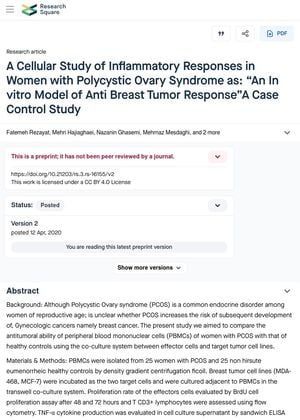A Cellular Study of Inflammatory Responses in Women with Polycystic Ovary Syndrome: An In Vitro Model of Anti-Breast Tumor Response - A Case Control Study
April 2020
in “
Research Square (Research Square)
”

TLDR Women with PCOS may have a reduced ability to fight breast tumor cells over time.
The study conducted in 2020 involved 25 women with Polycystic Ovary Syndrome (PCOS) and 25 healthy controls. The researchers aimed to compare the antitumoral ability of peripheral blood mononuclear cells (PBMCs) from both groups using a co-culture system with breast tumor cell lines. After 48 hours, the mean proliferation score of PBMCs was significantly higher in women with PCOS (921.04; P=0.021) compared to healthy controls (287.6; P=0.002). However, after 72 hours, the TNF-α concentration in PCOS women was significantly reduced compared to the 48-hour cultures (921.04 ± 271.4 pg/dl vs 545.6 ± 151.1 pg/dl at 48 h and 72 h intervals respectively, P<0.05), while it increased in healthy controls. The study concluded that the ability of PBMCs to produce TNF-α in women with PCOS decreased over time, potentially reducing their ability to form an efficient in vitro antitumor response to breast tumor cell lines.




